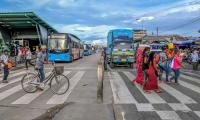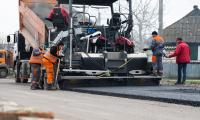Transition towards sustainable mobility in the Global South – how will Denmark contribute?
Yet, it is widely recognized that current financial flows from High-Income Countries (HICs) are insufficient to help LMICs overcome these challenges. For example, a recent study estimates a need for $550 billion annually to deliver Net Zero emissions from transport in the Global South by 2050, compared to estimated current annual investments of $15 billion, or only 2.7% of the need.
Denmark is not among the High-Income Countries that are particularly alert to this challenge, despite Denmark’s strong commitment to international development and climate goals, and the country’s obvious competencies within areas like green energy, active mobility, and efficient logistics. This is uncovered in a new analysis by Henrik Gudmundsson of CONCITO and Holger Dalkmann of SUSTAIN2030, called The importance of Sustainable Mobility to Climate and Development – Is Denmark ready to play a part? For example, the analysis shows that less than 0.5% of Denmark’s bilateral Official Development Assistance (ODA) goes to support sustainable transport in LMICs.
The analysis leads to several recommendations for how Denmark can activate its technical skills, resources, and strategic positions to help the necessary transition of transport in the Global South, and thereby contribute to promoting the synergies between climate, sustainability and poverty reduction, which are central to current Danish development aims.
Key recommendations include the following:
- 1. Include sustainable transport and robust infrastructure as a focus area in Danish development policy
Danish Government has decided to present a new development policy strategy for Denmark in 2025, as well as a specific strategy for engagement with Africa. The strategies are expected to have strong focus on creating synergies between poverty alleviation, sustainability, and climate resilience.
It is obvious to consider sustainable mobility and robust infrastructure in this context. Firstly, because many sustainability goals can be promoted jointly if clean, efficient, reliable, and cheap transport is made available to people and companies who today lack them. And secondly, because sustainable mobility and infrastructure would be natural extensions to existing Danish development priorities within, for example, poverty alleviation, energy efficiency, renewable energy, and climate adaptation.
To create better opportunities for supporting sustainable transport Danish Government should pursue the following actions:
- The Ministry of Foreign affair should prepare a strategic analysis on how to best incorporate sustainable transport as a topic area in the Government’s upcoming development strategies, aiming towards identifying relevant objectives, intervention areas, funding mechanisms, partners, levels of ambition, and timing for each element (including those proposed below).
- The Danish Ministry of Transport should be engaged in Strategic Sector Cooperation (SSC) between transport and planning authorities in Denmark and interested Partnership countries, both at national level and locally in cities; depending on national priorities among LMIC partner countries this could potentially extend existing partnerships on respectably green energy and climate resilience into transport and at the local level build on the existing SSC between Copenhagen and Bogota and Medellin, Columbia.
- The Danish Investment Fund for Developing Countries (IFU) should consider conducting a top-down sector-based analysis of the opportunities for commercial green investments within the transport and mobility area, preferably in partnership with one or more of the MDBs that the IFU is already collaborating with and who already have portfolios in this area, in order to pursue options for blended finance and similar innovative strategies.
- The Ministry of Industry, Business and Financial Affairs should (for example together with the State of Green PPP) explore how to boost Danish business clusters and ecosystems in relevant areas of competence to markets for sustainable transport solutions in the Global South (such as urban planning, safe cycling and walking infrastructure, electrification, logistics, port terminals, etc.)
- The Ministry of Foreign Affairs should use the presence in Denmark of international organizations with strong expertise in sustainable urban development like C40 Cities and the UNEP Copenhagen Climate Center to explore how multi-stakeholder, multi-sector initiatives for sustainable and climate-robust urban development (including mobility) could be fostered, jointly with the Danish Climate Alliance involving all Danish municipalities.
- The Ministry of Foreign Affairs should jointly with Ministry of Higher Education and Science establish a research program into the importance of sustainable resilient transport for meeting the SDGs, in collaboration with knowledge institutions in the Global South.
- 2. Engage in global collaborations for sustainable transport
The recent COP 28 agreement included key decisions essential for sustainable transport such as transitioning away from fossil fuels, phasing out inefficient fossil fuel subsidies, and promoting transformational adaptation action. These agreements need to be detailed and transformed into action via upcoming COP 29 and 30. The NDC Partnership, where Denmark is currently is the co-chair would be an important framework for helping LMICs materialize these ambitions e.g. by incorporating targets, actions, and domestic resources for sustainable transport.
Also, several multilateral initiatives enabling or directly dedicated to capacity building and finance for sustainable transport have been established or are underway, offering opportunities for Denmark’s engagement. And not least the UN General Assembly decision in November 2023 to designate the period 2026-2036 as the UN Decade of Sustainable Transport, provides an obvious opportunity for Denmark to engage and even co-lead agenda setting, implementation and monitoring of the decade.
On this background we recommend the following steps:
- Danish Government should assume an active role in international policy dialogues on climate and development finance up to and beyond COP 29, promoting initiatives to eliminate inefficient fossil fuel subsidies, enhance Domestic Resource Mobilization, provide significant additional funding for LMIC’s including for transport decarbonization and infrastructure resilience, and promote innovative finance like an IMO tax on international shipping with a dual purpose of taxing externalities and providing additional finance for countries in most need
- Danish Government should acknowledge the UN's upcoming Decade for Sustainable Transport and join like-minded countries in preparing an agenda for the Decade promoting synergies between poverty reduction, sustainable development, and climate in transport, and making sure that progress in monitored and fed into decision making at all relevant levels
- The Danish Ministry of Foreign Affairs should use Denmark's co-chairmanship of the NDC partnership 2024-25 as an opportunity to support LMICs in their efforts to develop comprehensive national goals and strategies for sustainable transport as part of the next generation of NDCs, for example building on the GIZ-SLOCAT NDC Transport Tracker.
- The Ministry of Foreign Affairs should in consultation with national stakeholders review already existing and upcoming multilateral initiatives focusing on capacity building and investments in sustainable transport in the Global South, such as MobiliseYourCity (MYC), which supports the development of plans for sustainable urban mobility in LMICs); the World Bank Decarbonisation Transport Facility (GFDT), focussing on data-based analysis and implementation of climate-friendly transport measures; and ACTIVE (Alliance for Cycling and Walking Towards International Vitality and Empowerment), initiated by the Dutch government with the aim to train 10,000 specialists in bicycle planning in the Global South by 2030 and raise funds for concrete projects - an area where Danmark has much to offer. Based on this review Denmark should decide which initiative(s) to engage in and in what way (capacity building, funding, knowledge sharing, or other).
- 3. Activate the EU in efforts to develop sustainable transport corridors and urban systems
Denmark holds the EU presidency in the second half of 2025. This will give Denmark a unique opportunity to help shape and boost EU climate and development policy, including the EU's position in the international climate negotiations leading up to and at COP30 in Brazil in 2025.
As a key point the EU has recently marked-up its engagement in global development with the so-called Global Gateway, which is the EU's large-scale 300 billion € investment initiative for building smart, clean and secure trade links between the EU and the Global South and thereby challenge China's geopolitical advance, which seems less invested in climate concerns and local, just economic development. The Gateway encompasses five strategic areas which seen together provides a unique framework for promoting smart, sustainable mobility investments in corridors as well as nodes.
Denmark should, towards its upcoming EU presidency work for,
- that key decisions relating to sustainable, low carbon resilient transport adopted at COP28 in the UAE sees a strong follow-up for COP 30, including speeding up the transition away from fossil fuels; reducing emissions from road transport; phasing out ineffective subsidies for fossil fuels; as well as including transport infrastructure in transformational adaptation action
- that the EU Gateway will promote an integrated and strengthened approach to sustainable transport across the initiative's five focus areas for the benefit of LIMICs and thereby also providing opportunities for Danish business and governance solutions for resilient and climate neutral transport corridors, terminals, and hubs in the Global South.
Authors: Holger Dalkmann, SUSTAIN2030 & Henrik Gudmundsson, CONCITO





